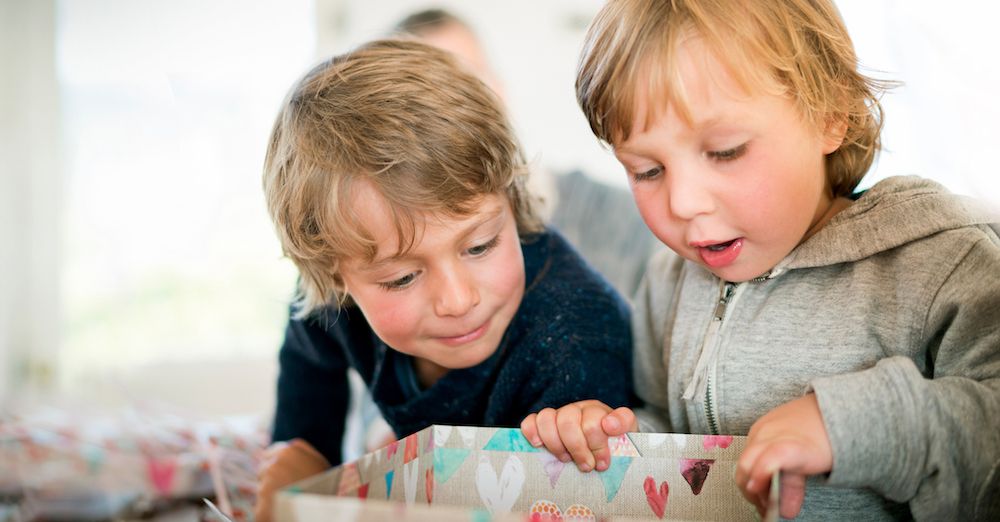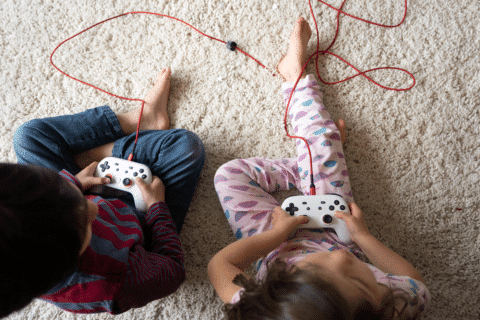Being a parent is the most rewarding job in the world. Also, the most demanding, exhausting, messy, stressful, maddening and hilarious. It’s no wonder that moms and dads can sometimes get a little…loopy. Hey, we’re not here to judge. But what we are here to do is bring a little insight (and a lot of levity) to these unique situations with some help from the creator of The Ugly Volvo, Raquel D’Apice. We call this Parent Brain. Consider it proof that you’re not alone. Or crazy.
How to make sure your children appreciate everything
We all would like to raise children who are appreciative or who are, at the very least, not conniving ungrateful monsters (#ParentingGoals). Agree? Good.
The first step in raising a child who appreciates everything is accepting that your child will absolutely not appreciate everything. For example, here is a thing that sometimes happens during the holidays:
- Child (who is a sweet, loving child with many adoring and loving relatives) receives a large number of gifts.
- Child opens early gifts with the enthusiasm of a puppy seeing snow for the first time.
- Child opens later gifts with all the enthusiasm of someone working a mind-numbing administrative job when they are two years from retirement.
That being said, I used to love the book Little House in the Big Woods, in which Laura Ingalls Wilder enthusiastically describes what she received one Christmas when she was a young girl in the 1880’s.
- A tin cup.
- A peppermint stick.
- A small heart-shaped cake.
- A penny.
Another year she got “an orange” and reacted with the enthusiasm of a child receiving an iPad and season tickets to Great Adventure. Over an orange. And as a young child I remember thinking, “HOW IS THAT ANY SORT OF EXISTENCE?” whereas as an adult I often find myself thinking, “Please, please someone explain to me how to raise a child who is overjoyed about receiving an orange, a cup, one candy cane and a penny.”
I don’t like telling people “how to make their children more appreciative” because I have never met their children and children are wildly different. And because many people have older children than mine and are dealing with the effects of peer pressure and hormones while I am still trying to get a four-year-old to look at people’s eyes when he says thank you. But I’m attempting it because it’s something I think about so often and is something I want so badly to do well. So take this advice with a grain of salt, which, for the record, is something else Laura Ingalls probably would have been super excited to find in her stocking.
Don’t give your child everything they want when they want it
I don’t have Snapchat on my phone, and my son is forced to wait until he is visiting my sisters to see what he looks like as a boy-dog hybrid with a tongue the size of a log flume. This at times makes him very sad (“Why can’t you get a phone that has that dog face thing?”) but in the long run makes him appreciate it that much more. This one is probably pretty obvious but seemed like the right place to start.
Control the grandparents
When your relatives go, “Oh, hey, I hope it’s ok that we bought your kid one hundred million presents because we love them and also this stuff was on sale and so cute!” go, “I’m so sorry, you are not allowed to do that anymore.” Set limits. If your kid is having a birthday, don’t be afraid to tell friends and family no gifts. If people show up with gifts anyway, don’t be afraid to throw those gifts in their faces and go, “I SAID NO GIFTS, YOU IGNORANT NE’ER DO WELLS!” and oh my goodness, I am obviously kidding. Please do not say that to anyone. But if your kid is little you can hide some of the gifts and dole them out over the course of a few months. Ok, weeks. Ok, days. YOUR CALL.
It’s possible to teach your relatives to buy fewer gifts the same way you are teaching your kid math or the names of the planets or how to use Snapchat. It will be hard, yes. But people can learn.
Get introspective
Children will copy what you do far more often than they’ll listen to what you say. Express gratitude for the things you value. If there are people you love, tell them how much you love them. If there is a physical object you care about, show them how carefully you tend to it. Do not let yourself have everything you want in the same way you do not let your child have everything they want.
Don’t make dinner
Ok, I’m definitely not saying this will work for everyone but since no one seemed to appreciate the work that went into cooking meals I began cutting up vegetables and cheese and serving improvised crudité platters for dinner 5 or 6 nights a week. On the evenings when I do cook, my son compliments the meal like he’s been wandering through a desert wasteland for months and has never tasted anything more fulfilling than my completely mediocre dish of chicken and pasta. I repeat: people appreciate things that they cannot have all the time.
When they’re young, tell them that the museum gift shop is a special exhibit and you’re not allowed to buy stuff there
Specific, I know, but this one is important. Especially since it doubles for toy stores. I tell my son he’s allowed to play with and look at stuff and if there’s anything he really loves he can add it to a birthday list.
Donate and volunteer to help people with less
Regardless of whether or not your child actually learns to appreciate things, this is just a good thing to do. Expose them to the world beyond their world. Show them that not everyone can afford food, let alone an iPad.
Thank your child for things
Sometimes it is easier for me to notice that my son has flooded the bathroom by overfilling the bathroom sink with water and suds than it is for me to notice that he did that because he was trying to wash his hands after using the toilet. I will assume (hope) I am not completely alone here. Thank them for whatever they’re trying to do and try not to grimace/cry/shout “Why me???” too visibly at everything else.
Tell them that life isn’t fair. And that’s okay.
When my son tells me he desperately wants something that I am not going to get for him, I try to let him know that I understand his disappointment but also remind him that life is full of people not getting things they want. I’ll then say, “Ok, now I’m going to tell you a bunch of things I want, and you tell me that I can’t have them,” and few things bring him more joy than listening to me announce that I would like “A horse and a fulfilling job with flexible hours and a rocket jetpack and Invisalign on my lower teeth,” and getting to shoot me down by telling me “No. You can’t have those.”
We do this every time I have to shoot down something he wants. I will rattle off a list of things I sit around wishing for: An apartment with a garden, an innate sense of style, a little house with a window seat and a fireplace, more free time to sit and read. It is sort of fun to think about things I want as well. And it has always seemed cathartic for him too.
“I’m sorry mama. You can’t have those.”
“Why not?” I ask. It is part of the script.
“Because,” he says, sighing. “You can’t have everything you want.”
“But I want those things!” I say. Sometimes I will throw a little bit of a pretend tantrum. (Try it. It’s fun.) “I want a backyard with a hammock in it! I want a house with a hot tub and maybe also a fireman pole from the top level to the bottom one!”
He shakes his head patiently. Sometimes he likes playing the grownup. “But you can’t have them,” he says.
“But don’t you get everything you want?” I ask.
“No,” he says. “No one does. But it’s ok.”
“Thanks,” I tell him. “I feel a little better.”
And honestly, listening to him talk, I actually do.






